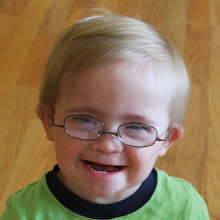I had the opportunity to attend a workshop at the National Down Syndrome Congress (NDSC) annual convention in San Antonio earlier this month. I enjoyed the speaker, Scott Shepard. Some of my peers were critical of the seminar that he did not speak from an early childhood perspective (they wanted to know how to address specific issues such as stop-drop-and-flop or "runners", etc.). But I've never attended any sort of behavior workshop in the past, so I did find the general information to be helpful. I'm of the opinion that if you can walk out of a workshop with at least one or two "to-do" items, then it was a beneficial workshop.
Here are my notes. Even if you aren't blessed with a child with an extra chromosome, I think you might find some of these thoughts beneficial in your parenting of your "typical" child.
What is the goal? To UNDERSTAND the behavior and WHY it is happening. ALL behavior has a COMMUNICATIVE purpose. By "listening" to what the behavior is saying, we can understand the reason the behavior is happening. So look at behavior as a language.
What IS behavior?
* a STRATEGY we use to get our needs met
* a METHOD of communication
* serves a PURPOSE and is MEANINGFUL
* includes GOOD BEHAVIOR as well as behavior that appears CHALLENGING
We need to teach replacement behaviors.
The A-B-C's of Behavior:
Antecedent (what happens before the behavior)
Behavior (an observable act)
Consequence (outcome or result of the behavior)
Don't just look at the frequency of the behavior... also look at the severity. For example, your child's teacher might mark down that the child STILL has a temper tantrum at the beginning of each class. But it's important to note and acknowledge that the tantrum has gone from 30 minutes to 30 seconds during the course of the semester.
(side note: visual schedules are VERY important for our kids)
Spontaneous reward systems work best. (okay, I wrote this down, but now I can't remember the answer to "Why?")
Elements of communication:
7% verbal
38% vocal
55% non-verbal
We need to say, show, and do.
* Say what you want people to learn, show them what you mean, and do it with them so they understand HOW.
Basic reasons behavior happens:
Sensory
Escape (avoid)
Attention
Tangible reward
We all have the same needs, but we need to change the times, tools, locations, etc.
* Avoid response-cost programs (meaning... don't take away something that the person has already earned)
It's okay to get angry... it's how we DEAL with the anger that gets us into trouble.
My "duh" moment, but worth reminding myself: "There is an inverse relationship between a person's social and communicative ability and behavioral issues." Think: toddler tantrums. Also, remember that this can be one of the main reasons people think that our kids with designer genes have behavior issues. Their communication skills tend to lag the general population, so their "toddler behaviors" tend to last beyond the toddler years. This is why we focus so much on speech and language with Micah. In my opinion, the best way for him to feel included with his peers is for him to be able to communicate with them. And for those of you who have non-verbal children, my recommendation is to find a way for them to communicate with you. That might require an augmentative communication device. Whatever works.
Pumpkin Patch 2018
7 years ago





3 comments:
wow, this was good! I hope you post more about any workshops you attended.
cassie showed me the HUGE book you all got with all of the info from the conference. I will be getting copies of that session. Pertains to so many children
Any others you would hight reccommend me copying?
Great information Jennie! Many of this information is not only useful with "neuro-typical" children, but with children with autism also. My son has Pervasive Developmental Disorder-NOS (PDD-NOS) and many of they Applied Behavioral Analyis therpies use similar strategies. I'm glad to know that there are some consistencies across the board with learning to communicate no matter a person's abilities!
Post a Comment